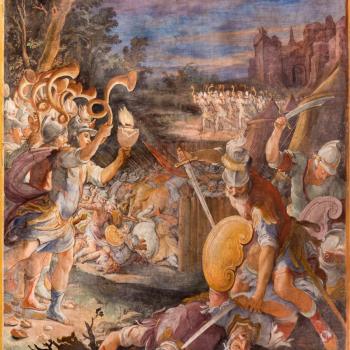A note to my readers:
This next series will cover some personal ground. In my articles, I usually do not relate details of my personal life, not to any great detail at least. I do this out of a handful of convictions: first, because I believe in our culture we overemphasize the “personal narrative,” or “lived experience.” We often do this at the expense of the publicly accessible fact. It is not that the former are unimportant, but today they are given too much weight in the assessment of truth.
Second, because to write personally means to also incorporate into one’s essays at least some details about other people who you know and who know you. The problem of misrepresentation (or feeling misrepresented) quickly emerges. Thus, personal stories must always be tempered with wisdom about what to share, how much, which details to leave out, and who to name and not name, etc.
Third, personal narratives will be, must be in some sense, treated prima facie with skepticism. Since I am not personally known to many of my readers, the opportunity to doubt my integrity will arise if and when I present things that do not agree with a reader’s preconceptions or preunderstandings. I can only stress here that while I will relate my journey through a particular theological framework, a Christian one, nothing here related is false, manipulated or “fake news.” Facts are related as facts known to me given my senses. Interpretations are the matter of my reasoning and the facts coming together in meaningful synthesis. Articulation of those interpretations is what will hereby follow.
Finally, since this series does touch on personal issues, I will be extra careful about what types of comments I allow. Comments need not agree with my interpretations of the events, but they must be a) respectful, b) substantive and relevant and c) worth reading by other commentators.
God bless,
Anthony Costello
Midway Through Life’s Journey…
Midway upon the journey of our life
I found myself within a forest dark,
For the straightforward pathway had been lost.
Ah me! how hard a thing it is to say
What was this forest savage, rough, and stern,
Which in the very thought renews the fear.
So bitter is it, death is little more;
But of the good to treat, which there I found,
Speak will I of the other things I saw there.Dante, L’inferno, Canto I
On Saturday, September 3rd, 2022 I had a heart attack after a short 4-mile run. I had never experienced anything like it, and I have experienced quite a bit physically (both good and bad). A few minutes into the attack, screaming from my bedroom floor, my housemate, a trustworthy friend and brother in Christ, found me crumpled over. I quickly got dressed and he whisked me off to the nearby hospital, St. Jude. By Sunday afternoon, after an angiogram, the doctors made a diagnosis: three arteries, to include the main artery, were severely blocked: 100%, 90% and 75%. Heart surgery was not optional.
That surgery, a quadruple bypass, was successfully performed the following Tuesday. My recovery began on that Tuesday afternoon and is currently ongoing. The doctors made note that the success of the surgery was in part due to my otherwise good physical health. Whether it matters or not, my cholesterol levels and such things usually associated with heart issues like this, were not elevated. The best explanation for the heart incident: probably genetic.
I am a 46-year old father of three, young boys. From the moment of the heart attack through the pre-operative period and into the recovery, my focus was almost entirely on them. On how they would receive such news, on how I would care for them, and how they would process the fragility of human life. But those concerns, as deep as they were, did not overwhelm me. That said, there are a few reasons why I believe I was able to both genuinely feel for the needs of my children (and others), but not to the point of experiencing them through a sense of uncertainty and fear. In fact, throughout the entire process, fear was an emotion that registered not even once (here the reader will have to choose to believe me or not).
There were other emotions, to be sure. But not for a single moment did I experience any of the following in any significant way: fear, anxiety, frustration, hopelessness or loneliness. Not once. Any concern I had, for my children, my parents, or others, simply did not rise to the level of fear. But the question then is “why not?” To answer that, we must talk of reasons. But to talk of reasons, we must speak of God.
Though We Are Afflicted Daily: The Problem of Pain
Why are we afflicted in this life? For the non-believer, the problem of pain and suffering has been the source of many arguments against the truth of God’s existence, or, if not His existence, His goodness. It is a classical “problem,” one that has its more logical forms and objective responses, and its more personal and experiential ones. We are not going to rehearse these here: the back and forth, to and fro between Christian apologist and counter-apologist is well documented throughout the historical and philosophical literature and an abundance of material exists online. Only briefly would I suggest reading two books in response to “the Problem”: first, Alvin Plantinga’s God, Freedom and Evil, and second C.S. Lewis’ classic The Problem of Pain.
For my purposes here, however, I will only be commenting about affliction in light of, from within the context of, an already committed Christianity. Thus, what is affliction in light of the Cross of Christ? What is pain for the man or woman who already knows him or herself as a bondservant of the Suffering Servant (Isa 53) and patient of the Great Physician? For the Christian disciple, what does it mean to suffer?
Affliction as Opportunity To Know God
First, any affliction the Christian undergoes–mental anguish, physical pain, emotional turmoil–most of which almost always come in frightful unison, is an opportunity. Affliction is an opportunity in two ways: first, when handed over to the care of almighty God, affliction becomes the primary means through which we come to know God more intimately. Paul speaks of the “fellowship” of Christ’s sufferings and his desire to join in them:
But everything that was a gain to me, I have considered to be a loss because of Christ. More than that, I also consider everything to be a loss in view of the surpassing value of knowing Christ Jesus my Lord. Because of Him I have suffered the loss of all things and consider them filth, so that I may gain Christ and be found in Him, not having a righteousness of my own from the law, but one that is through faith in Christ—the righteousness from God based on faith. My goal is to know Him and the power of His resurrection and the fellowship of His sufferings, being conformed to His death, assuming that I will somehow reach the resurrection from among the dead.
2 Corinthians 3:7-11
The biggest mystery, and one most difficult to articulate to non-believers, is how beautiful pain and suffering can be when they are experienced together with the love of God. I can say, although skeptics may doubt, that the week of my heart attack, surgery and recovery was simply, and without qualification, one of the happiest of my life. This may sound strange to some. Still I don’t even know if one must be Christian to have this kind of orientation toward or experience of pain. After all, God provides common grace to all, and naturally endows even His rebellious children with virtue and insight (that they simply take for granted).
Still, the opportunity to fellowship with God in suffering is so rich, so pleasurable (in a non-masochistic sense) that saints throughout the Church’s history have consistently prayed for it, just as their apostolic predecessors. I will talk more about the experience of God’s love in the midst of pain in a later portion of this series (on “The Beautiful Mercies of God”). This longing to share in Christ’s cross, however, is entirely counter-intuitive to the world’s values. Thus, even Marcus Aurelius, considered one of the better pagan monarchs in history, could not himself understand this Christian desire to fellowship in the suffering life of God:
Marcus Aurelius (161-180), the ‘philosopher on the throne,’ was undoubtedly the noblest of pagan rulers…And yet Marcus Aurelius must be reckoned amongst the persecutors of the Christians. As a stoic philosopher he despised the Christian Religion, because it was as a religion of suffering and self-abasement. In his Meditations he attributes the Christians’ fearlessness in the face of death to ‘mere obstinacy.’ He was ignorant of the source whence these nameless heroes drew a strength superior to his own.
John Laux, Church History, 57
Indeed how ignorant even the greatest of philosophers and kings can be about the source of true strength. This is one reason why modern pagan rulers still fear the “obdurate” (meaning genuine) Christian man or woman: for the true follower of Christ has no fear of worldly power, since worldly powers can only try to compel through pain (in fact the greater enemy to the Christian is the worldly power that compels via the offer of pleasure and ease). In sum, affliction is first and foremost an opportunity for the Christian to know God and know Him more deeply.
Affliction as Opportunity To Know My Neighbor
If the first opportunity suffering offers us is greater knowledge of God, then the second kind of opportunity affliction can be is one that opens us up to greater knowledge of each other. For as God gives His love to us in the midst of trial, and as we are commanded to love God with our whole heart, soul, mind and strength, so too are we commanded to love our neighbor as ourselves and, in turn, give our love to them as they experience their own fiery trial.
But, as everyone knows, the person most able to console the sufferer, to understand, empathize and show compassion, is the person who has experienced a similar or commensurate kind of suffering. Widows care for widows in ways others cannot. Former drug and alcohol addicts help current ones; one-time gang bangers speak truth to those presently in prison, and those who reached the heights of social fame or intellectual enterprise only to fall from them, are the best to mentor and train those experiencing struggle on the way up. And so Paul also says this about suffering:
3 Praise the God and Father of our Lord Jesus Christ, the Father of mercies and the God of all comfort. 4 He comforts us in all our affliction,[b] so that we may be able to comfort those who are in any kind of affliction, through the comfort we ourselves receive from God. 5 For as the sufferings of Christ overflow to us, so through Christ our comfort also overflows. 6 If we are afflicted, it is for your comfort and salvation. If we are comforted, it is for your comfort, which is experienced in your endurance of the same sufferings that we suffer. 7 And our hope for you is firm, because we know that as you share in the sufferings, so you will share in the comfort.
2 Corinthians 1:3-7
And so God brings us trials of various sorts so that we can know each other through the application of common compassion and shared support. God wants us to know Him first and each other second. It is through shared affliction that this happens at the deepest level of human experience. Men who have gone to war, for example, know of a brotherhood others do not.
Redeemed and Unredeemed Affliction
In the economy of human pain, there is either pain that is redeemed by God and that can lead to greater expressions of love and charity and humanity. Or, conversely, there can be pain left unredeemed. Unredeemed pain, however, is the source of all humanity’s perpetual evils: of grudges and bitterness, of plots and schemes, of revenge, of the green eye of jealousy and self-consuming envy, and of the persistent cancer of feeling one has always “gotten the short end of the stick” in life. I have written about the problem of unredeemed pain elsewhere.
Imagine, for example, if Joseph had failed to recognize God’s providential hand in his life, and how God redeemed his misery for the sake of a nation. His response to his brothers may have been quite different than this:
19 But Joseph said to them, “Don’t be afraid. Am I in the place of God? 20 You planned evil against me; God planned it for good to bring about the present result—the survival of many people.21 Therefore don’t be afraid. I will take care of you and your little ones.” And he comforted them and spoke kindly to them.
Genesis 50:19-21
Perhaps in some alternative possible world, bizzaro Joseph, his pain and misery seen only in terms of his own life and not in the great economy of the Divine Plan, would have answered his brothers plea with “off with their heads!” as opposed to providing for them and their children in the land he now ruled. At the end of the day, and of time itself, unredeemed pain will continue to be as ugly and devastating as it is now. There is a place reserved for those who persist in making their pains the source of everyone else’s problems. At some point, God will ensure that hurt people stop hurting people who have been hurt. Unredeemed pain that leads us to cause further pain remains a fire that burns forever (Mark 9:42-48).
But for pain redeemed and for those who allow the redemption of their pain, there is a glorious state of affairs that awaits. The fires of trials become like salt for those redeemed in Christ (Mark 9:48-50). And salt is that which preserves and is pleasing to the taste. James R. Edwards clarifies Jesus’ words about fire and salt in Mark 9:49-50:
Fire and salt both test and prove substances, and because of this they are helpful metaphors of discipleship. Again, since the fire in v. 49 is no longer a fire of perdition as in v. 48 but of purification…disciples are to allow the sacrifices inherent in following Jesus to purify their lives. Likewise, salt is a preservative. In a world without refrigeration, salt preserves foods, especially meat, from putrefying. Christians, similarly, are a preservative in society, apart from which society will become rotten.
Edwards, The Gospel of Mark, 295
This is why any fellowship with Christ’s sufferings now, is but a taste of the glory to come.
Conclusion: When God Takes You on A Detour
When God seems to take your life in an unexpected direction, on a “detour,” one should know this: the road you are now on is the right road. You were on the detour before the unexpected shift occurred. As Christians we realize that we are all prone to wander, to drift from either God’s holiness or His call. Sometimes the drift need not be large nor the detour great, but enough to where God will have to correct us.
For those whose desire for holiness is genuine, and whose call profound, small detours may result in what seem to be rather large course corrections. One only need to read the life of the saints, both ancient or modern, to know that great shifts in fortunes (or what by worldly standards are seen as fortunes), are part and parcel of the life of the man or woman “on call” for Christ. Edwards again elucidates, however, how painful course corrections in the life of the Christian disciple should be understood:
Discipleship to Jesus lays a total claim on one’s life; in the language of sacrifice, it must be totally consuming or it is worthless. Rather than consuming believers in frustration and failure, however, trials make their walk holy and acceptable to God….Testing by fire is not simply a painful necessity of discipleship, but an offering itself pleasing to God, a seasoning or salting with fire. If fires of trials and adversity beset the faithful (1 Pet 1:7l 4:12), they do so as a consequence of their following the Son of Man who must suffer.
Edwards, Mark, 296
Yesterday a friend and colleague visited me during my convalescence. He too is a genuine brother in Christ. When I told him this past week and a half of suffering a heart attack, undergoing bypass surgery, and feeling pains unlike any I had felt before was also one of the happiest times of my life, it came to him as no surprise. It was no great mystery to this fellow believer that heart attack, major surgery and the various concerns associated with them could be this way. In fact, as we grow in maturity, the question emerges of whether or not the endurance of pain and suffering could be any other way.
In the next post of this series, I will talk about the first thing God revealed to me in my week (or so) of trial: the beauty of God’s people, His wonderful Church.














